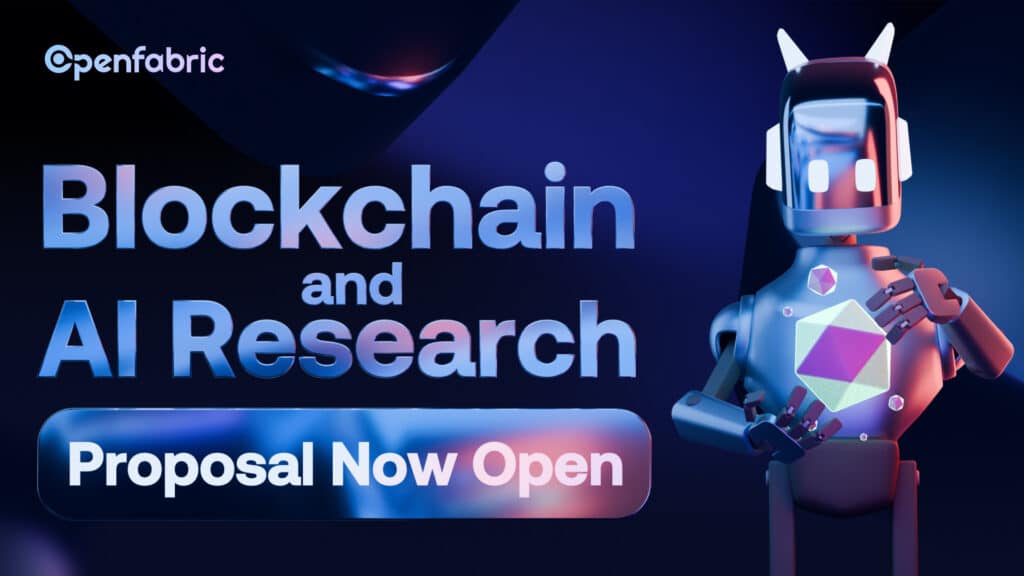
December 4, 2024 13 minutes read
The Openfabric Decentralized AI Research Grant Program

The previously announced and well anticipated decentralized AI grant launch is here! In more details, the Decentralized AI Research Grant Program aims at advancing Artificial Intelligence and the field in general by funding innovative research projects across key verticals. This program supports enthusiastic researchers, individuals in academic fields and other industry professionals interested in exploring security, optimization, consensus mechanisms and ethical considerations with decentralized AI systems.
This program will also increase the information and knowledge of AI and blockchain through the accurate information provided by researchers. The next section of this post contains further details of the grant program.
Here we go!
What are the objectives of the program?
The program has the following objectives all aimed at promoting the growth of decentralized AI technology.
- Advance the knowledge of AI through cutting-edge research that pushes the boundaries of decentralized AI.
- Promote security and privacy by encouraging the development of secure and private decentralized AI systems.
- Enhance the performance through the support of optimization techniques that improve the efficiency and scalability of decentralized AI systems.
- Innovate new and improved consensus mechanisms and protocols suitable for decentralized AI environments.
- Address the ethical and societal implications of decentralized AI technologies and promote positive societal outcomes of these technologies.
- Facilitate interdisciplinary and cross-institutional collaborations
Categories of the decentralized AI research grant program
The grant program is divided into four main verticals, namely;
Security and Privacy in Decentralized AI
Focus Areas:
- Trusted execution environments and virtualization.
- Secure secret storage solutions.
- Decentralized identity management systems for AI applications.
Optimization and Performance in Decentralized AI
Focus Areas:
- Development and optimization of federated LLMs in decentralized networks.
- Advanced GPU and CUDA optimization techniques.
- Fragmentation and distribution of AI models on decentralized GPU infrastructures.
Consensus Mechanisms and Algorithms in Decentralized AI
Focus Areas:
- Innovative real-time consensus mechanisms.
- Comparative analysis of consensus algorithms.
- Comparative study of decentralized AI learning algorithms.
Ethical Considerations and Societal Impact of Decentralized AI
Focus Areas:
- Ethical implications of decentralized AI-based surveillance.
- Impact on workforce inclusion and diversity.
Who is eligible for this grant?
Applicants
- Researchers and faculty members from accredited universities and research institutions.
- Industry professionals and practitioners in the field of decentralized AI.
- Collaborative teams combining academia and industry are encouraged.
Geographical Scope
- Open to applicants worldwide, subject to compliance with applicable laws and regulations.
Project Requirements
- Projects must align with one or more of the grant categories.
- Proposals should demonstrate originality, feasibility, and potential impact.
- Interdisciplinary approaches are also welcome.
Application Process
Submission Materials:
- Project Proposal (maximum 15 pages), including:
- Abstract.
- Objectives and significance.
- Literature review.
- Methodology.
- Expected outcomes.
- Project timeline.
- Budget justification.
- Applicant CVs: Curriculum vitae for all key personnel.
- Letters of Support (if applicable): From collaborating institutions or industry partners.
Review process for all submissions.
- Initial Screening: Applications will be checked for completeness and eligibility.
- Peer Review: Proposals will be evaluated by a panel of experts in decentralized AI and related fields. The submissions for the grant would be evaluated based on the following criteria:
- Relevance: Alignment with grant program objectives and focus areas.
- Innovation: Originality and potential to advance the field of decentralized AI.
- Methodology: Soundness of research design and feasibility.
- Impact: Potential for significant contributions to knowledge, technology, or society.
- Qualifications: Expertise and track record of the research team.
- Collaboration: Level of interdisciplinary and cross-institutional cooperation.
- Budget and Resources: Justification and appropriateness of the budget relative to the proposed work
- Final Selection: Funding decisions will be made based on reviewer recommendations and program priorities.
Intellectual Property and Data Sharing
Intellectual Property Rights:
IP generated from the funded research typically remains with the grantee institution.
Data Sharing:
Researchers are encouraged to make data and tools openly accessible, respecting privacy and confidentiality.
Collaboration Agreements:
Any collaborations should have clear agreements regarding IP and data sharing.
Ethics and Compliance
Ethical Standards:
- Research must adhere to high ethical standards, including considerations for privacy, consent, and data protection.
Regulatory Compliance:
- Compliance with all relevant laws and regulations, including those related to human subjects research.
Suggested topics for the decentralized AI research grant program
1. Trusted Execution and Virtualization Environments in Decentralized AI Systems
Objectives:
- Integrate trusted execution environments (TEEs) and virtualization technologies into decentralized AI networks to enhance the security and privacy of AI computations.
- Address challenges in implementing TEEs within decentralized AI platforms to ensure secure model execution and data protection without relying on central authorities.
- Improve trust and integrity in decentralized AI applications through secure execution frameworks.
Methodology:
- Literature Review: Analyze existing TEEs and virtualization technologies, focusing on their applicability to decentralized AI contexts.
- Design and Development: Create a prototype that combines TEEs with decentralized AI platforms (e.g., federated learning frameworks), emphasizing secure and private model training and inference.
- Testing and Evaluation: Assess the prototype for performance improvements, security enhancements, and scalability compared to traditional centralized AI systems.
- Security Analysis: Perform threat modeling and vulnerability assessments specific to decentralized AI environments to ensure robustness against potential attacks.
Expected Outcomes:
- A validated prototype demonstrating enhanced security and privacy in decentralized AI systems using TEEs.
- Best practices and guidelines for implementing TEEs in decentralized AI architectures.
- Publications detailing research findings, challenges, and proposed solutions for secure decentralized AI execution.
2. Development and Optimization of Federated Large Language Models (LLMs) in Decentralized Networks
Objectives:
- Develop methodologies for training federated LLMs over decentralized networks that preserve data privacy and reduce the need for centralized coordination.
- Optimize performance, scalability, and communication efficiency in federated learning systems for LLMs within decentralized infrastructures.
- Enhance model accuracy while ensuring data sovereignty and confidentiality across distributed nodes.
Methodology:
- Algorithm Design: Create decentralized federated learning algorithms for LLMs that leverage peer-to-peer communication and decentralized optimization techniques.
- Implementation: Deploy federated LLMs across a network of edge devices or decentralized nodes, utilizing blockchain or decentralized ledger technologies for coordination.
- Performance Evaluation: Compare the decentralized federated model’s performance against centralized and traditional federated models in terms of accuracy, convergence speed, and communication overhead.
- Optimization: Apply model compression, quantization, and asynchronous update strategies to reduce communication costs and improve scalability.
Expected Outcomes:
- A set of optimized decentralized federated learning protocols for LLMs that maintain high performance with enhanced privacy.
- Empirical data demonstrating the trade-offs between model accuracy, communication overhead, and decentralization benefits.
- Open-source tools or frameworks facilitating the deployment of federated LLMs in decentralized environments for the research community.
3. Advanced GPU and CUDA Optimization Techniques for Decentralized AI Applications
Objectives:
- Develop novel optimization strategies in GPU(Graphic Programming Unit) programming using CUDA(Compute Unified Device Architecture) to accelerate AI computations in decentralized networks.
- Improve computational speed, energy efficiency, and overall model performance for AI tasks distributed across multiple decentralized GPU nodes.
- Provide guidelines for efficient utilization of GPU resources in decentralized AI workloads.
Methodology:
- Benchmarking: Identify performance bottlenecks in decentralized AI models when executed on distributed GPU infrastructures.
- Algorithm Enhancement: Optimize memory usage, communication patterns, and parallel processing techniques in CUDA kernels tailored for decentralized execution.
- Implementation: Apply these optimizations to various decentralized AI models, including those used in federated learning and edge computing scenarios.
- Evaluation: Measure improvements in execution time, energy consumption, and model accuracy compared to non-optimized decentralized implementations.
Expected Outcomes:
- Enhanced CUDA programming techniques resulting in significant performance gains for decentralized AI applications.
- A comprehensive guide or toolkit for developers to optimize AI models running on decentralized GPU platforms.
- Academic publications and presentations showcasing the optimization methods and their impact on decentralized AI performance.
4. Fragmentation and Distribution of AI Models on Decentralized GPU Infrastructures
Objectives:
- Design algorithms for partitioning AI models to run efficiently across decentralized networks of GPUs.
- Address challenges related to data synchronization, network latency, and resource allocation in decentralized AI processing.
- Enable scalable AI computations suitable for large datasets and complex models without central coordination.
Methodology:
- Model Partitioning: Develop techniques for splitting AI models into smaller, independent components that can be processed in parallel across decentralized nodes.
- Decentralized Framework Development: Build or adapt existing frameworks to support the execution of fragmented models in a decentralized manner, leveraging peer-to-peer communication protocols.
- Synchronization Protocols: Implement efficient, decentralized communication protocols to manage data consistency and parameter updates without centralized servers.
- Performance Testing: Evaluate the decentralized system’s scalability, throughput, and latency under various network conditions and workloads.
Expected Outcomes:
- A robust system for executing AI models on decentralized GPU infrastructures with demonstrated performance improvements.
- Insights into optimal fragmentation strategies and their impact on model accuracy and speed in a decentralized context.
- Contributions to the field of decentralized AI computing through published research and shared open-source software tools.
5. Innovative Consensus Mechanisms Focused on Real-Time Dynamics in Decentralized AI Networks
Objectives:
- Propose new consensus algorithms that facilitate real-time data processing and model updates in decentralized AI systems.
- Enhance the scalability and adaptability of decentralized AI networks under dynamic conditions, such as changing node availability and variable network latency.
- Evaluate the security and efficiency of these mechanisms in supporting decentralized AI workloads.
Methodology:
- Theoretical Framework: Develop consensus models that accommodate the specific requirements of decentralized AI, such as timely aggregation of model updates and robustness to stragglers.
- Simulation and Modeling: Use simulation tools to test the consensus mechanism under scenarios typical for decentralized AI, including heterogeneous node capabilities and intermittent connectivity.
- Security Analysis: Assess the protocol’s resilience to attacks that could compromise AI model integrity, such as poisoning attacks or malicious updates.
- Comparative Study: Benchmark the new mechanism against existing decentralized consensus protocols in terms of speed, scalability, and security within AI applications.
Expected Outcomes:
- A validated real-time consensus algorithm tailored for decentralized AI systems, enabling efficient and secure collaborative learning.
- Detailed analysis of performance metrics and security properties relevant to decentralized AI networks.
- Recommendations for implementation in decentralized AI platforms and potential industry applications.
6. Secure Secret Storage Solutions in Decentralized AI Systems
Objectives:
- Investigate cryptographic methods and architectures for secure storage of sensitive data and AI models in decentralized environments.
- Develop systems that provide robust access control, data encryption, and key management without centralized authorities.
- Enhance user trust and data protection in decentralized AI applications by ensuring confidentiality and integrity.
Methodology:
- Requirements Analysis: Identify the unique security needs and threat models for secret storage in decentralized AI systems, such as protecting model parameters and private datasets.
- Design: Create a decentralized secret storage architecture leveraging technologies like distributed ledger technology, threshold cryptography, and secure multi-party computation.
- Prototype Development: Implement the proposed solution and integrate it with decentralized AI frameworks, ensuring compatibility and ease of use.
- Security Testing: Perform comprehensive security evaluations, including penetration testing and cryptographic validation, to ensure robustness against unauthorized access and data breaches.
Expected Outcomes:
- A secure, scalable, and user-friendly secret storage solution tailored for decentralized AI platforms.
- Documentation of the system design, including innovative security protocols and decentralized key management strategies.
- Contributions to enhancing privacy and security standards in decentralized AI technologies.
7. Comparative Analysis of Consensus Algorithms for Decentralized AI Systems
Objectives:
- Conduct a comprehensive comparison of existing consensus algorithms focusing on their suitability for decentralized AI workloads.
- Identify the strengths and weaknesses of each algorithm in facilitating collaborative AI model training and inference without centralized control.
- Provide recommendations for selecting appropriate consensus mechanisms based on specific decentralized AI use cases.
Methodology:
- Algorithm Selection: Choose a representative set of consensus algorithms relevant to decentralized AI, such as Gossip-based protocols, Federated Averaging, and Blockchain-based consensus.
- Criteria Development: Establish evaluation metrics like convergence speed, communication overhead, fault tolerance, and impact on model accuracy.
- • Empirical Analysis: Simulate decentralized AI tasks (e.g., federated learning) using these algorithms, analyzing their performance under varying network conditions.
- Comparative Assessment: Compile results into a structured comparison highlighting key findings and trade-offs.
Expected Outcomes:
- An authoritative report detailing the comparative performance of various consensus algorithms in decentralized AI contexts.
- A decision-making framework to assist researchers and practitioners in selecting the most suitable consensus mechanism for their decentralized AI applications.
- Identification of potential areas for algorithmic improvement and innovation specific to decentralized AI needs.
8. Ethical Considerations of Decentralized AI-Based Surveillance
Objectives:
- Analyze the ethical implications of using decentralized AI technologies for surveillance purposes, considering the balance between collective benefits and individual rights.
- Develop a framework that ensures privacy, consent, and transparency in decentralized AI surveillance applications.
- Offer guidelines for ethical implementation and policy development to prevent misuse of decentralized AI in surveillance.
Methodology:
- Case Studies: Examine instances where decentralized AI is used in surveillance, such as distributed sensor networks, crowd-sourced data collection, or community-based monitoring systems.
- Ethical Analysis: Apply ethical theories and principles to assess the impact on privacy, autonomy, and societal norms.
- Stakeholder Engagement: Gather perspectives from technologists, ethicists, legal experts, and communities affected by decentralized AI surveillance.
- Framework Development: Synthesize findings into ethical guidelines or a decision-making model for practitioners and policymakers.
Expected Outcomes:
- A comprehensive understanding of the ethical challenges posed by decentralized AI-based surveillance.
- A published framework to guide ethical decision-making in the design, deployment, and governance of decentralized AI surveillance technologies.
- Recommendations influencing policy, regulatory standards, and best practices to ensure responsible use of decentralized AI in surveillance.
9. Comparative Study of Prominent Decentralized AI Learning Algorithms
Objectives:
- Compare and contrast AI learning algorithms designed for decentralized settings, including federated learning, swarm intelligence, and gossip learning.
- Evaluate their effectiveness, computational requirements, communication overhead, and suitability for various decentralized AI applications.
- Identify potential for hybrid models or improvements in algorithm design to enhance decentralized AI performance.
Methodology:
- Algorithm Selection: Choose a diverse set of decentralized AI learning algorithms applicable to different problem domains.
- Experimental Setup: Implement each algorithm on standardized datasets distributed across simulated or real decentralized networks, considering data heterogeneity and privacy constraints.
- Performance Metrics: Assess convergence rates, model accuracy, communication costs, scalability, and robustness to network changes or node failures.
- Analysis: Interpret results to understand the strengths and limitations of each algorithm in decentralized contexts.
Expected Outcomes:
- A detailed comparative analysis providing insights into the practical application of different decentralized AI algorithms.
- Guidelines for selecting appropriate algorithms based on specific problem characteristics, network conditions, and resource constraints in decentralized environments.
- Identification of opportunities for algorithmic enhancements or the development of novel hybrid approaches to improve decentralized AI learning.
10. Impact of Decentralized AI on Workforce Inclusion and Diversity
Objectives:
- Examine how decentralized AI technologies influence workforce dynamics, inclusion, and diversity by potentially democratizing access to AI tools and decision-making processes.
- Investigate the role of decentralized AI in reducing centralized biases and empowering underrepresented groups.
- Propose strategies to leverage decentralized AI for promoting equitable opportunities and mitigating biases in the workplace.
Methodology:
- Literature Review: Study existing research on the impact of decentralized AI on workforce inclusion, diversity, and organizational structures.
- Data Collection: Gather data through surveys, interviews, and case studies of organizations adopting decentralized AI technologies.
- Bias Analysis: Identify patterns of inclusion or exclusion linked to the deployment of decentralized AI systems.
- Strategy Development: Formulate interventions and best practices to enhance workforce inclusion and diversity through decentralized AI.
Expected Outcomes:
- An analytical report highlighting the effects of decentralized AI on workforce inclusion and diversity.
- Actionable recommendations for organizations to harness decentralized AI in fostering inclusive and diverse work environments.
- Contributions to policy formulation and the establishment of ethical standards for the responsible use of decentralized AI in human resources and organizational development.
11. Assessment of Decentralized Identity Management Systems for AI Applications
Objectives:
- Evaluate the effectiveness of decentralized identity management systems (DIMS) in supporting secure and private AI applications.
- Identify gaps in current DIMS that hinder their integration with decentralized AI, such as interoperability, user experience, and scalability issues.
- Propose enhancements to address challenges like secure authentication, data privacy, and seamless user interaction in decentralized AI ecosystems.
Methodology:
- System Review: Analyze prominent decentralized identity platforms (e.g., Self-Sovereign Identity solutions) and their compatibility with decentralized AI applications.
- Evaluation Framework: Develop criteria focusing on security protocols, privacy preservation, user control over data, and integration capabilities with AI systems.
- Testing: Perform hands-on testing of DIMS in conjunction with decentralized AI platforms, evaluating their performance in real-world scenarios.
- Gap Analysis: Identify limitations and challenges in current DIMS that affect decentralized AI deployment and user adoption.
Expected Outcomes:
- A comprehensive assessment report outlining the strengths and weaknesses of decentralized identity management systems in the context of AI applications.
- Recommendations for enhancing DIMS to better support decentralized AI, including technical improvements and user-centric design considerations.
- Potential design of an improved identity management solution that addresses identified gaps and facilitates the secure, private, and efficient operation of decentralized AI systems.
Aim of Research
These updated research topics are designed to advance the understanding and development of decentralized AI technologies. This addresses both technical challenges and ethical considerations. By focusing on decentralized AI perspectives, the proposed studies aim to:
- Enhance Security and Privacy: Develop solutions that protect data and AI models in decentralized environments, where traditional centralized security measures are not applicable.
- Improve Scalability and Efficiency: Create algorithms and optimization techniques that enable efficient AI computation across distributed networks without relying on central coordination.
- Promote Ethical Practices: By considering the societal and ethical implications of decentralized AI and ensuring technologies are developed and deployed responsibly.
- Facilitate Inclusion and Diversity: Explore how decentralized AI can democratize access to AI technologies and empower underrepresented groups.
- Advance Decentralized AI Infrastructure: Build the foundational frameworks and tools necessary for the widespread adoption of decentralized AI systems.
Conclusion
In conclusion, this grant program is in line with Openfabric’s plan to create a future where AI is integrated fully in our society. With the clearly defined objectives, methodologies, and expected outcomes, these topics will help to drive AI knowledge. The research topics also provide a roadmap for meaningful contributions to both academic research and practical applications of decentralized AI.
Submmit your proposal by filling the form.
For more updates, visit our WEBSITE today!

